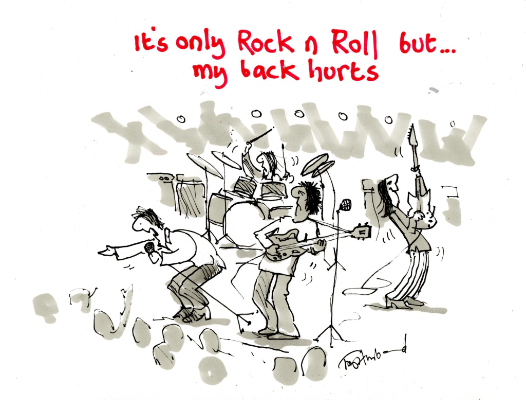In the world of rock'n'roll, it's your job to look like a swaggering star. You have to hang on to yourself. But you can't let people know you're suffering, because, if you look behind you, there's a queue of people waiting to take your place. Once you let on that you have an issue, people will stop calling because they feel they might not be able to rely on you.
While public admissions of illness, mental and physical, are becoming all the rage, the result is shows missed and voices lost.
What can you do about it? Well, after you've had specific issues checked by a doctor, if you keep doing the same thing then the same thing will keep happening. Instead, you can invest in yourself and find out what you're doing wrong, and work towards doing things differently. Change your habits, lose the bad ones and create good ones, and you'll find that you perform with more ease and flow.
Which one are you?
A singer, well, where to start? In an effort to deliver the show night after night, and front the band and be the centre of attention, you give more and more until your voice starts to break up and fail you. You can't hit the high notes, or hold the long ones, but luckily the crowd know them all and sing for you. Also the comedown after a show is getting harder to manage. In an effort to continue the buzz you go for a few drinks after, if not more, and you try and live up to the legend of aftershow parties.
You wear a 20lb Les Paul around your shoulders for several hours a day. There's a long soundcheck that's made longer by technical issues and bandmates pissing about. Once the gig starts, you're happy, giving everything you've got and putting on a great show. After, you just want to wind down with a beer or three and sleep the sleep of the dead. Your bed for the night is a two-foot wide bunk on a bus, but you sleep like a baby because you're used to it. In the morning, a few aches and pains, but you take some painkillers with breakfast and relax for the day, because at 4pm you'll be sound checking again. You ignore the pain in your right shoulder blade because that's just part of the job.
You're a drummer who is at your best when behind the kit, before a large crowd. Nothing beats the feeling on stage. However, you've been noticing a funny pain down the back of your leg, and it starts in your right hip. No amount of repositioning on the stool makes it go away. Also there's some bits of your back that feel like they're about to give way, but you can't tell anyone because they won't call you again. More painkillers please.
A keyboard player who gives it everything you've got. But those rock and roll songs feel like they're getting faster. Your wrist is giving you trouble.
A record producer, in the chair for long, long sessions. Totally focused on the job, you hunch over the mixing desk all day. You have to be the foundation of the session, keeping the band on track and enthused.
That slug face you make when you play guitar, to show how hard you're working? No need, although you can do it anyway. What you want to be is John Entwistle, fingers flying while the rest of him stays stock still. Joe Cocker throwing his head around and flapping his arms? No need, although he looked so great doing it. The trick is to look like you're rocking out but in reality you're not grinding your joints into submission and wearing yourself out generally.
"Do you know who I am??"
I'm a touring performer. I've been around the world (well a few places anyway). I've been on planes, trains, tour buses, in splitters, on stage, in the bar afterwards. I think I've done every conceivable permutation of gig. I see what people go through. I trained to teach the Alexander Technique, which was developed from the late 19th century by a theatrical performer called Frederick Mathias Alexander (FM to his friends) who kept losing his voice. My father, Tony Visconti, a record producer and bass player, also trained as a teacher. My mother, Mary Hopkin, took lessons from one of the Alexander Teacher legends, Mary Holland. The best music and drama schools teach Alexander Technique.
The Technique has made countless performers more resilient. While we don't claim to offer a cure for specific conditions, the Technique helps you to make better use of your mind and body, together, so that you're not using more energy or effort than you need to. You can deal with stress, strain and pain better when you're more coordinated.
And as for the aftershow, the travel, the hotel rooms, the splitter bus where you spend six hours staring at your bandmates... there's an itch to be scratched. To grab some food at the services. Chocolate bar and coffee. Then after the show, a beer, some shots... the rider is always well stocked with booze. I know how it feels - the last chance to eat or drink. But it's not. There's always more. And you don't have to have it. As I went on with the Technique, I felt that itch lessen. I didn't have to go all out.
So, if rock'n'roll is catching up with you, give The Alexander Technique a try and see what we can do together. I know the score.
Cartoon by the legendary Tony Husband, in collaboration with Jessica. He will be sorely missed. He came to see us play as Holy Holy in Hull City Hall in 2017 with his friend Marc Riley.

